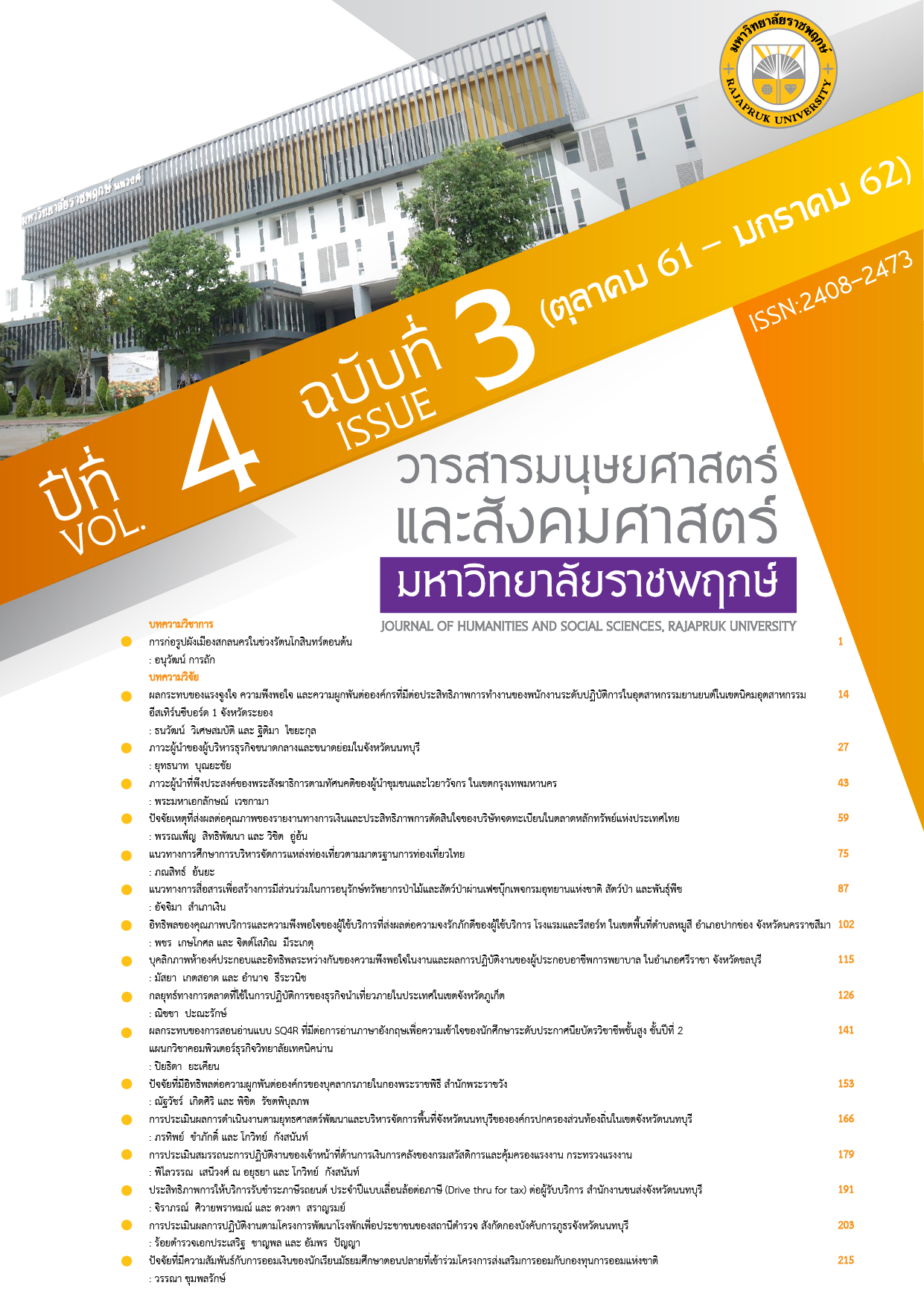Relationship between Big Five Personal Traits and Simultaneous Reciprocal Influences between Job Satisfaction and Job Performance of Nursing Professionals in Sri Racha Sub-district, Chon Buri Province
Main Article Content
Abstract
The objectives of this research were to study the relationships between Big Five Personal Traits Job Satisfaction and Job Performance and to finds selected by Nursing Professionals in Sri Racha Chon Buri and study the relationnship between Relationship support Job Satisfaction and Job Performance. The sample group was found by Convenient Sampling with type Non-Probability Sampling into 322 Medical Personals exactly and there are 100% in both hospitals. Data were collected by questionnaire then analyzed by Structural Equation Modeling (SEM). The research tools were Big Five Personal Traits questionnaires of Costa and McCrae (1992) including agreeableness, conscientiousness, extraversion, neuroticism and openness in experience, Job Satisfaction questionnaires of Broman and Motowidlo's (1993) including intrinsic and extrinsic and Job Performance questionnaires of Porter and Lawler (1968 ) including task and contectual with five-point Likert scale. The result indicated that the model fitted the empirical data. Big Five Personal Traits about conscientiousness and neuroticism were positively related to Job Satisfaction. Extraversion, Openness to experience and neuroticism were positively related to Job Performance. Job Performance was simultaneous reciprocal influences with Job Satisfaction of Nursing Professionals at the significant level of 0.001. However, the roganization should support personnality developmnet which will getting the high level of satisfaction and performance.
Article Details
References
Abubakr M. Suliman et al. (2010). Personality trait and work performance in a duty-free industry. International Journal of Commerce and Management, 20(1): 64 - 82.
Adrain Furham et. at. (2002). Do personality factors predict job satisfaction. Personality and individual differences, 33: 1325 - 1342.
Alf Crossman and Bassem Abou-Zaki. (2003). Job satisfaction and employee performance of Lebanese banking staff. Journal of Managerial Psychology, 18(4): 368 - 376.
Arthur E. Poropat et. al. (2009). A meta-analysis of the five-factor model of personality and academic performance. Psychological Bulletin.
Cheng-Liang and Mark Hwang. (2014). Personality traite and simultaneous reciprocal influences between job performance and job satisfaction. Chinese Management Studies, 8(1): 6 - 26.
Dev Jani and Heesup Han. (2013). Personality, social comparison, consumption emotions,satisfaction, and behavioral intentions. International Journal of Contemporary Hospitality Management, 25(7): 970 - 993.
Gregory M. Hurtz and John J. Donovan. (2000). Personality and Job: The Big five revisited. Journal of Applied Psychology, 85(6): 869 - 879.
John W. Liunsbury et al. (2012). Managing Service Quality: An International Journal. Managing Service Quality, 22(5): 517 - 536.
Jose’ R. Goris. (2007). Effect of satisfaction with communication on the relationship between individual-job congruence and job performance/satisfaction. Journal of Management Development, 26(8): 737 - 752.
Melissa C. O’Connor and Sampo V. Paunonen. (2007). Big Five personality predictors of post-secondary academic performance. Personality and individual differences, 43: 971 - 990.
Miranda A. G. Peeters et al. (2006). The big five personality traits and individual satisfaction with the team. Small group Research, 37(2): 187 - 211.
Muhammad Awais Bhatti et al. (2014). Effect of personality traits (big five) on expatriates adjustment and job performance. Equality, Diversity and Inclusion: An International Journal, 33(1): 73 - 96.
Murray R. Barrick and Michael K. Mount. (1991). The big five personality dimensions and job performance: A Meta-Analysis. Personal Psychology, p. 44.
Sriraporn, P. (2017). Relationship between Personality type by Jung Typology Test and Major selected by Business Administration students of Rajapruk University. Journal of Humanities and Social Sciences Rajapruk University, 1(2): 60 - 68. (in Thai)

